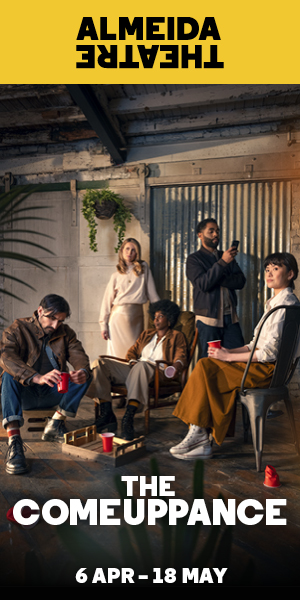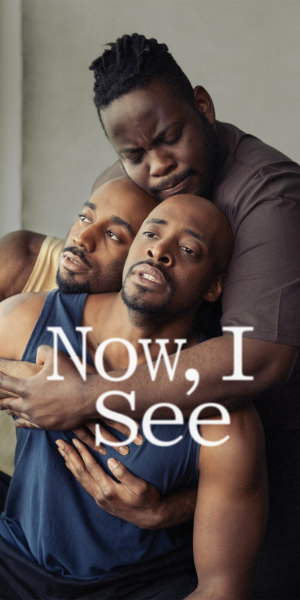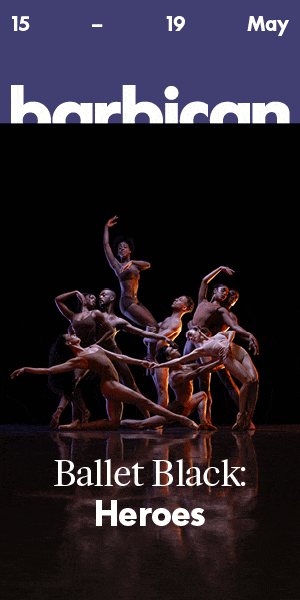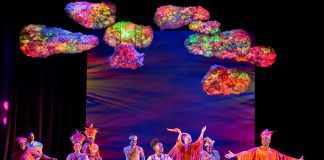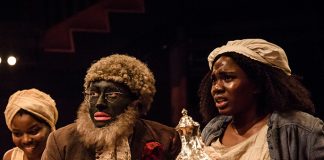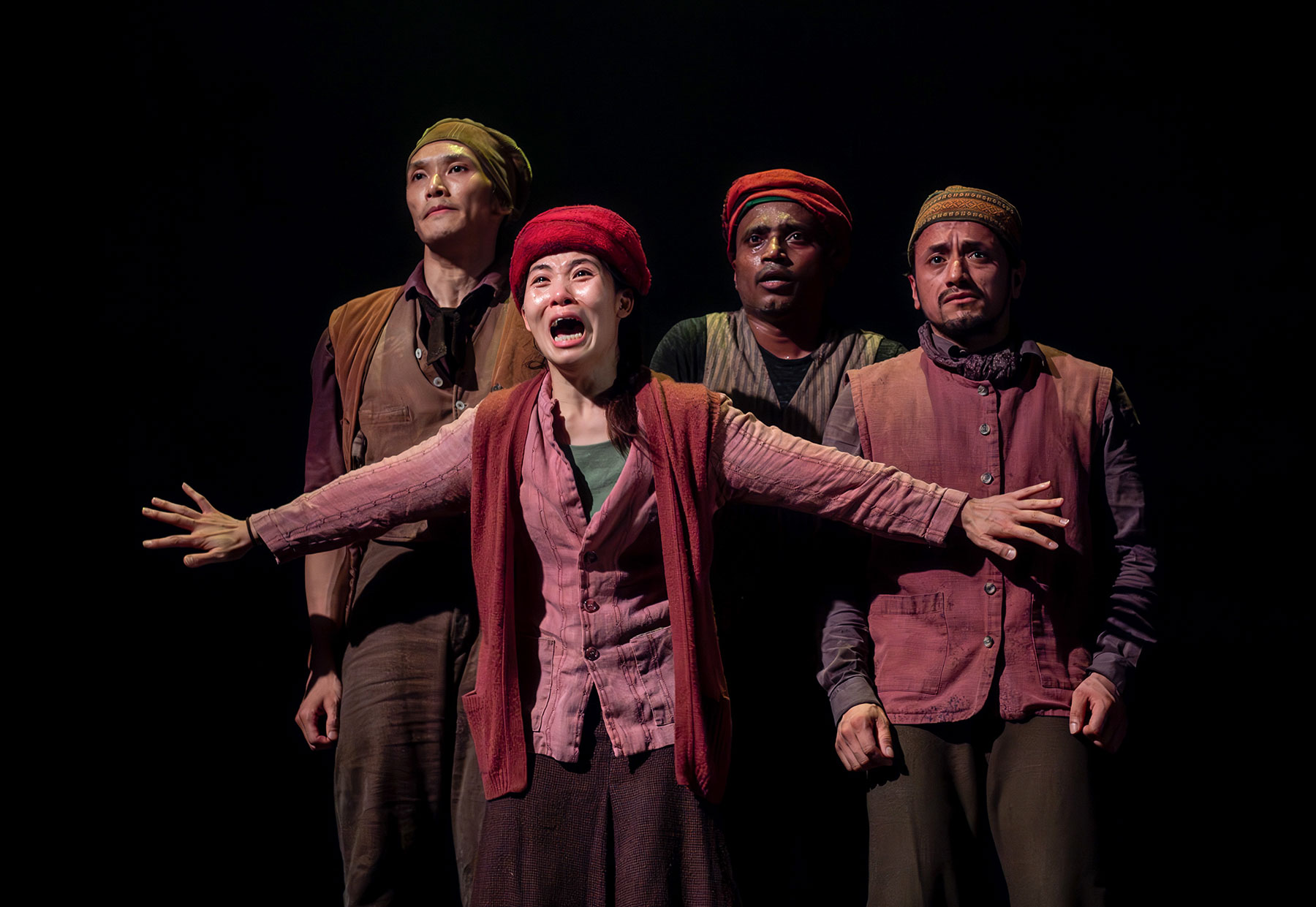
Upon entering the National Theatre to experience Gecko Theatre’s production of Amit Lahav’s Kin, I was welcomed into an atmosphere of rousing folk songs, pockets of billowing smoke and a dimly lit space. On stage, a solitary streetlight was situated next to an out-post, with a string of fairy lights adorning the façade.
A burst of immigration officers tumble through the door, in exuberant celebration; drinking beer, and cigarettes balancing in their mouths while punching the air; all the while, dancing – as if in a folk-like flash mob.
A revolve of the stage uncovers a small wooden desk, a chair, and a ramp of impoverished immigrants; all at the precipice of a guillotine-like barrier. The immigration officers – the ones we had met previously – take great pleasure in denying entrance into the ‘promised land’.
Lahav and the ensemble create powerful vignettes, which viscerally respond to the plight and humanity of immigrants seeking refuge (home). Through a series of nomadic journeys, the performers take us on an emotional, harrowing, and poignant pilgrimage of hope, loss, politics, and power.
The labelling and ‘othering’ of communities is starkly illustrated in one particularly dark and impactful scene: a nonchalant officer paints a yellow stripe down the back of an immigrant, who implores that her visa be approved; instead, she is detained and humiliated.
A cacophony of voices in different languages filled the space. Meaningful stories and raw interactions were strongly transmitted by the hugely talented and multilingual cast. I didn’t need to hear English text in order to feel and understand what was being portrayed. The physicality and subtle gestural nuances of the ensemble evoked a myriad of emotions; creating empathy, not only for the protagonists on stage, but for the communities enduring forced-migration – such as refugees from Palestine, the Democratic Republic of Congo, Syria, Ukraine, Afghanistan, and Sudan.
The mesmerising original music by Dave Price – the vocalists, musicians, and sound by Mark Melville – all beautifully underscore the optimism, love, and lament emitted by the protagonists; and situate the audience within the surroundings that they find themselves in.
Rhys Jarman’s costumes and set are effective, witty, and functional. His extraordinary puppets invoke the spirits of ancestral homes, whilst embodying the friends, families and ‘loved ones’ of immigrants trying to gain a foothold.
Kin explores and challenges our connection with culture, identity, and family. Questions such as ‘Who am I?’ ‘Where do I belong? and ‘What community am I a part of?’ are at the heart of this ambitious piece. Lahav’s explores ritual and the commonplace: the sharing of food, stories, dance, and song. I was reminded of the basic prerequisites of being human – love, food, shelter, and respect.
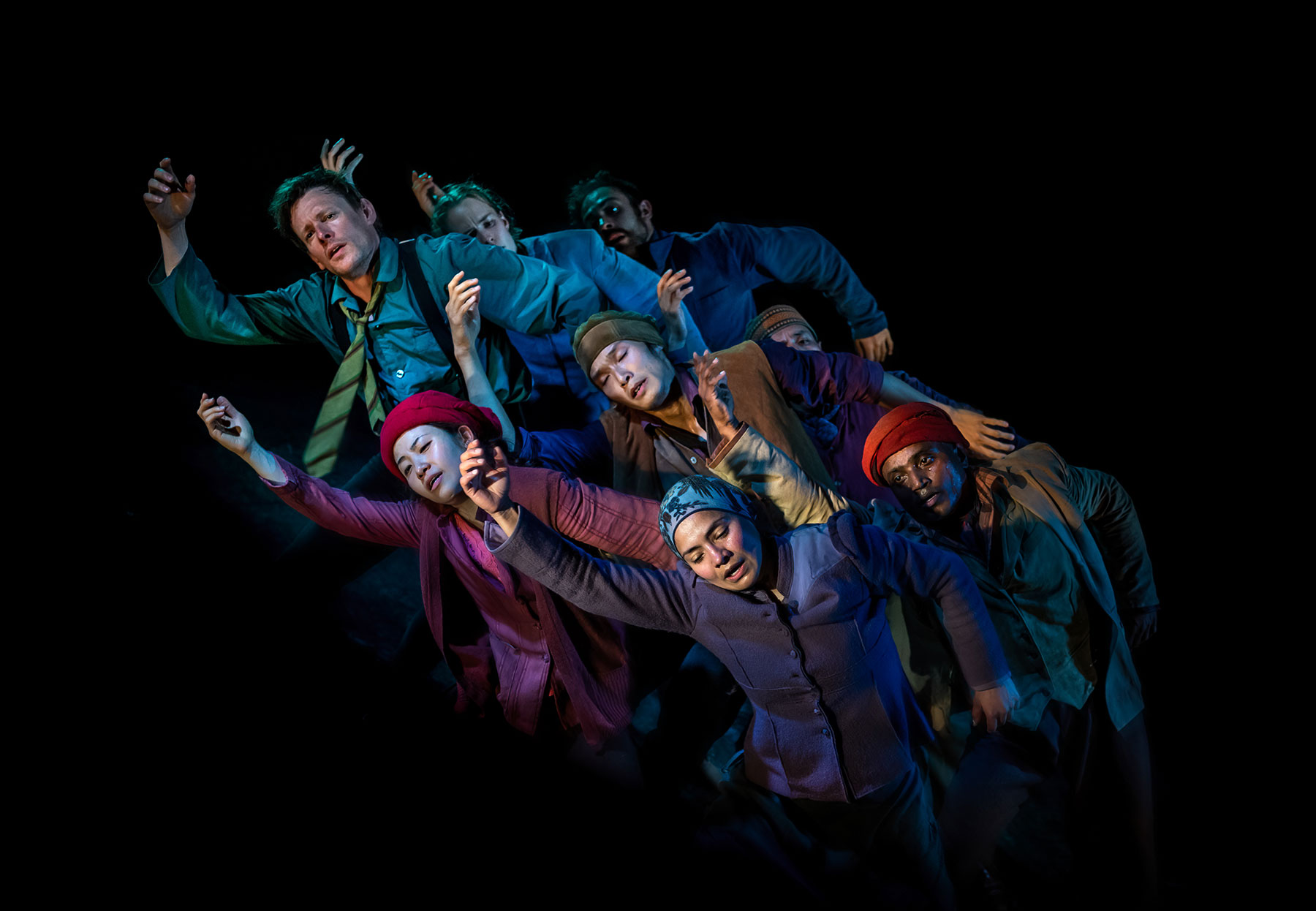
Kin not only depicts the physical, emotional, and financial struggle of immigration, but artistically demonstrates the ground shifting underneath one’s feet, and the incessant migration of people fleeing for their lives. Hugely explicit is the demonisation of immigrants trying to find safe passage and ultimately sanctuary. Chris Swain’s remarkable lighting supports the aforementioned states, and provides the audience with stunning light, shade, and colour – as we transverse the globe, becoming ever-more emotionally impacted by events.
One stand-out scene worthy of mention is the farcical portrayal of entering a country’s borders. The immigration officers play dress-up as they abuse the potential refugees. We witness a pregnant woman being refused access as she is kicked in the stomach, while another refugee – who adopts a blonde Boris Johnson style wig – sails through immigration and is welcomed with open arms. The lottery of whiteness and privilege is clearly and concisely attested to in this demonstration.
Assimilation and whiteness rear their ugly heads later on in proceedings, as we become privy to an immigrant and his family being forced to both apply ‘white face’ and adopt the aesthetics and language of a Western culture, in exchange for legal / safe passage into the country. Saju Hari and Wai Shan Vivian Luk superbly navigate the enormity of this scene with great prowess. Assimilation to conform to another dominant culture’s attitudes and norms can often turn into indoctrination. This is depicted by a child of immigrants who upon entering manhood espouses xenophobic ideas in order to abuse other immigrants.
Lahav’s use of breath, gesture, mime, movement, text, and dance offers a master class in physical theatre. The layers of meaning from each artistic component is an important addition when addressing the sheer complexity of migration and injustice, and their effect on human beings. The transitions between personal accounts were seamless, and the movement and sound motifs were well judged. The power of unison phrases and flocking motifs where effectively implemented – I would have loved to have seen a further progression of this movement language.
Another poignant stand-out scene was played by the transcendent, Vanessa Guevara Flores, who is subjected to the bile of bigoted immigration officers who confine her in a dentation cell. The light source is overhead and becomes frenetic and looms over her as she dances, lowering as she views her family, friends and her life going past her on a continual loop (the action supported by the circling revolve).
“Lahav’s use of breath, gesture, mime, movement, text, and dance offers a master class in physical theatre. The layers of meaning from each artistic component is an important addition when addressing the sheer complexity of migration and injustice, and their effect on human beings”.
The arresting image of people wearing life jackets, and being cast adrift in the sea, is a powerful one, and is highlighted sensitively in Kin. Even the immigration officers are swept away in the life vests. It serves as a cautionary look at what can happen when you follow an edict on immigration blindly. It is reminiscent of the poem First They Came by Pastor Martin Niemoller.
First they came for the Communists
And I did not speak out
Because I was not a Communist
Then they came for the Socialists
And I did not speak out
Because I was not a Socialist
Then they came for the trade unionists
And I did not speak out
Because I was not a trade unionist
Then they came for the Jews
And I did not speak out
Because I was not a Jew
Then they came for me
And there was no one left
To speak out for me
Gecko Theatre has produced a piece of though-provoking art, which honours the lives of immigrants past and present. There is no single narrative; only stories of the human experience, which Gecko Theatre tells exceedingly well.


























